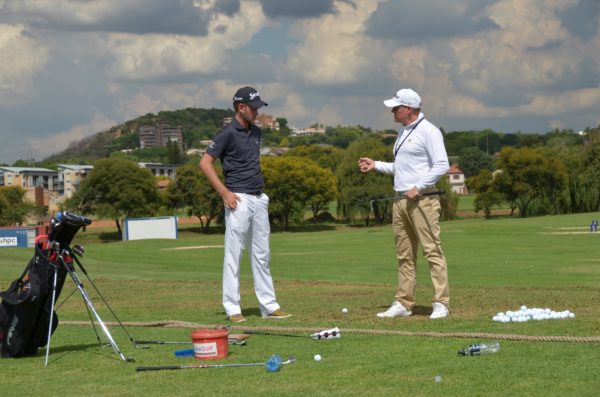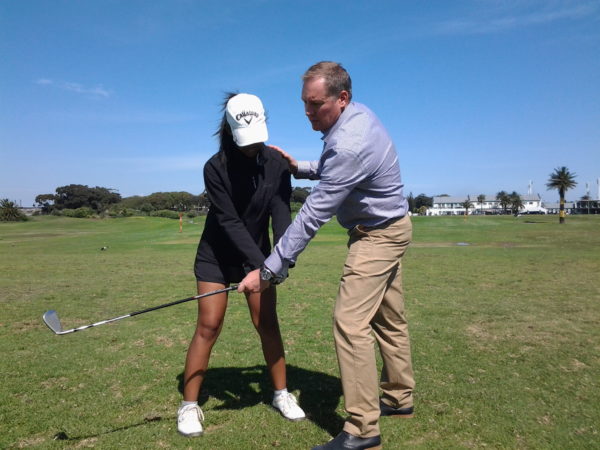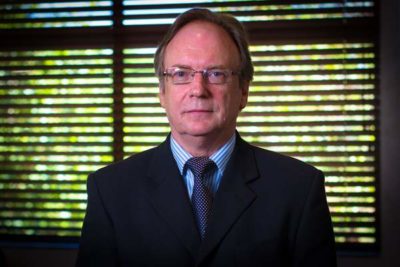Grant Hepburn CEO of GolfRSA, in conversation with our series moderator and host John Cockayne

Grant Hepburn is the spokesman on this the second part of the business of Golf Discussion Series on golf development, which will look at the challenges presented by golf development in South Africa.
However, this does not mean that Grant’s perspective is limited only to the Southern end of the African continent as he has worked all over the World for the past 20 years, including time spent on the PGA Tour, Asian Tour, European Tour and South African Sunshine Tour.
His coaching experiences have not been limited to the swings of professional golfers, but also the game’s rank and file amateur players and in this context he has managed and run golf academies in America, Germany and the UK.
Grant has also trained over 100 coaches worldwide including those at the Chinese National Golf Academy in Shenzhen
Since he has been based back in South Africa, he managed the coaching programme for the SA Golf Development Board since its inception in 1999, before being appointed as the managing director of the SA Golf Development Board in 2013.
Grant then subsequently took over his current role in 2015 as the CEO for the umbrella body for golf South Africa – GolfRSA.
GolfRSA https://www.golfrsa.com/
Now we continue the discussion which began last Friday 21st June and continued on Friday 28th June.
John Cockayne: South Africa is a mature market in golfing terms, but one which needs to overcome historical imbalances and perceptions of the game, while generating traction amongst non-whites’ market, especially women, to hope to sustain the game’s player numbers at even its current levels.
This poses the dual challenge of the social hurdles, in terms of income, combined with the structural factors in golf not being a street game.
Do you think that this is a fair summary?
Grant Hepburn: In terms of social hurdles I would say that there are a growing number of people that were previously disadvantaged and now are in a position where they can afford to play golf and be active club members.
However, they fight against the perception of being unwelcome at golf clubs and in fact many people, outside of the game, feel threatened or uneasy walking into a golf club.

The reality is that most clubs are welcoming, but outsiders don’t always know that, so the industry perhaps needs to do more in terms of changing those perceptions.
And you are right, golf is not a street game, unlike football where all you need is a ball, a small space and a few people to have a game.
Golf requires specialised maintenance equipment and facilities; each person needs golf clubs and access to an actual golf course in order to play. So it’s certainly not a game that can be played at an informal or casual level or in a community hall or field.
JC: We are both PGA members, who have coached extensively, so you and I come from a similar place and I made the point, in the introduction, about what I felt to be an over concentration on junior golf, especially in terms of sustainability.
What are your feelings on this?
GH: I think that in terms of juniors, we do a lot for the ones that are already in the game. We have coaching, league sides, junior tournaments around the country run by clubs and golf unions and a healthy junior program run by GolfRSA.
However, we could certainly do with attracting many more new juniors to the game.
The added advantage of attracting juniors is that you stand a chance of creating golfers out of their parents if they aren’t players already.
The SAGDB (SA Golf development board) has done an amazing job of introducing over 30,000 disadvantaged young golfers to the game and this has had a very positive impact in our country.
The challenge is that in order to get these youngsters to coaching and playing facilities, we rely on funding and having to overcome the logistical challenges of transport – so it’s not an easy process. We try to focus these types of projects in low income communities that are near to golf practice facilities or clubs.
JC: Yes, perhaps readers in the ‘West’, or developed nations might not realise that transport is a real issue here given the lack of and often the inefficiencies with the existing and quite limited ‘government’ public transport options.
I recall a discussion with the then GM at Randpark Club, in the 1980s, where a golf initiative had been started for the caddies.
The club and professionals provided golf clubs (for those who needed them), a clinic, and a round of golf plus competition prizes, all of which was FOC on a Monday when the course was closed to members.
The only problem was that the caddies couldn’t afford the transport costs to get to and from the club on day when they would earn no wage by caddying!
GH: Exactly! We have had great support from the golf clubs and ranges who offer use of facility, special concessionary memberships, etc. all FOC or at very nominal rates, but this all falls flat if the transport issues are not addressed.
This makes the access and proximity elements here in South Africa a fundamental prerequisite, if any programme is going to be sustainable and successful.
 JC: Outside of formal and structured development programmes I feel there is the need to be innovative and more imaginative in ensuring that doors to try the game out are opened up and prospective golfers made to feel welcome.
JC: Outside of formal and structured development programmes I feel there is the need to be innovative and more imaginative in ensuring that doors to try the game out are opened up and prospective golfers made to feel welcome.
I am also fatigued by the continual debate about the dangers allegedly posed by virtual clubs (whatever that is supposed to mean!?) and even driving ranges to traditional golf clubs, when the reality is that we should be working together and pooling our energies, resources and activities to help ensure a growth in both playing and member numbers.
GH: Initiatives that encourage more rounds, or which introduce more players to try the game are all on-ramps and should be lauded and supported.
There is a whole raft of independent development activities from the PGA club pro’s coaching at their own clubs, to your own Corporate Golf Academies Programme which is aimed at companies introducing golf to their staff and clients.
There will always be some fly-by-night type things (it’s just human nature – sadly), but, in the vast majority, these programmes have a place and achieve their desired objectives.
To be successful and sustainable, the growth of golf here needs to be seen not just as the sole responsibility of GolfRSA and the SAGDB, but as a collective effort.
We can all contribute whether this is as a part of a formal programme run by a provincial golf union, a Father showing his son the basics on the club’s practice tee, or someone taking a friend along with them on a Sunday to hit a few golf balls at the local driving range.
JC: I made the comment in an article some years ago, about the need to fish where the fish are in development terms, especially as this applies to South Africa’s population demographics and the fact that golf is a middle class and up sport in terms of the income needed to sustain any interest.
How would you see these needs in bullet point?
GH: I think we need a layered approach and this would include:
- Turning golf and golf initiatives into social events, especially aimed at attracting families.
- Broadening the appeal by using other sports’ personalities, who play golf, as brand champions for golf.
- Accentuating that the game is a sport for everyone and one where strength, gender or age make no competitive difference due to the handicap system and nature of the game. You hit your own ball and play from the tee that you choose.
- Working to attract new golfers from within the retiree market who have time and resources to take up the game. The potentially hidden upside to this is cascading an interest in the game down for example from father to son – the same dynamic could apply here from grandparent to grandchild.

JC: My other axe (I’m still grinding it along with my teeth!) relates to having the game seen as an official sport across the country at schools.
Being exposed to the game helps to develop the type of character that will stand you in good stead for life’s challenges – and life, as we all know, is sadly not a team sport!
I have to ask the question that as a life role model for a child to look up to, would a parent be likely to prefer to reference a Premier League soccer player, or a professional golfer?
GH: Ah well now – you are talking to the converted here! There are things that you pick up from every sport and certain things are integral to the game of golf.
In a sport like rugby it’s the bumps and bruises that are a part of the game; in golf it will be integrity (golfers are largely their own referees), responsibility and independence which will come with playing golf. These are fantastic characteristics to learn and be exposed to – just another reason for schools, children and parents to embrace the game.
JC: I am often pleased to point out to others that unlike other sporting codes, we golfers don’t have euphemisms for cheating such as the term ‘professional foul’.
That’s not to say that golfers have never cheated, but that sort of behaviour goes against the inbuilt ‘honour-code’ that sits at the heart of golf.
I once asked a soccer fan (a friend and I’m happy to report that he still is one!) that if one of his team’s players fell down in the box (through no fault of anyone else) and the referee awarded a penalty, what the outcomes would be if the same player told the referee that no one had touched him?
My friend thought that it was a trick question(!)…but in answering the question for him I pointed out that it is more than likely that if the player wasn’t sanctioned for arguing with the referee (!), his own team mates would want to strangle him and if they didn’t get to him, a large number of fans would almost certainly be waiting outside the stadium and wanting to lynch him!
GH: The behaviour and lessons associated with golf are socially profound and can equip a young person with a toolbox of vital life-skills and positive attitudes that can last a lifetime.
Golf teaches one how to battle inner demons and combat one’s own inadequacies – ultimately there is nobody else to blame or to play on your behalf.
JC: I also feel that the fee-paying and private schools are a natural target audience for golf development. What are your thoughts here?
GH: It would be advantageous if golf was an official school sport nationally, and that is something that GolfRSA will work towards.
There are clubs that have outreach programmes for the schools in their area, but often it isn’t an integral part of their annual marketing strategy.
If the programme is driven solely by the club professional, it often flounders because it takes a concerted effort not just by one person, but by several role players within a club in order to make an outreach programme successful.
Clubs that ‘own’ these initiatives tend to have the most success because it also takes more than a few lessons with the club professional. There needs to be engagement with the parents perhaps through fun events, family lunches/breakfasts as well as special offers for the families involved in these projects.
JC: I am on the record (repeatedly!) about golf being the worst at telling its own good news stories.
Recently these comments have been directed at how little the ‘outside world’ knows about the transformation in maintenance processes and the great efforts made (especially in the golf estates) with eco-projects, rehabilitation of wetlands, the creation of bird and insect friendly grasslands and habitats, etc.
In terms of environmental matters, most of the knockers still think that we use drinking water to irrigate the fairways and greens and it’s largely our fault that these perceptions remain unchallenged!

GH: I completely agree that golf often gets a bad rap when in fact it does so much as a sport for a country. It creates thousands of jobs, brings millions into the economy in terms of tourism spend and also it helps to shape society in a positive way.
JC: OK so just for once, let’s break the mould of silence and please share with us the inside story on what has made you most proud since being involved with the Golf Development Board and latterly GolfRSA?
GH: OK – it’s difficult as there have been so many moments, ranging from the obvious like one of our players winning a major national or international event, to seeing the delight on a kid’s face when he or she middles a shot for the first time.
First, the Development Board has been in existence for over 20 years and to date over 30 000 people have gone through its programmes.
All of the players of colour on the provincial teams (250 of them at this stage) have come through the Development Board and without exception ALL are there on merit.
Last year the SAGDB received an award from the PGAs of Europe for the best development programme in the world, which made us hugely proud.
The same can be said of the National squad where out of 22 players – one-third are of colour and are present in the squad solely on merit – there are no government or ‘required’ quotas.
Ironically all this been achieved through a team effort in a sport which is quintessentially an individual one!
Last year SA players won the British Amateur qualifier, the British Amateur, the Junior British Amateur, East of Ireland Championship, etc.
Great though these achievements are, the fact that the R&A complimented us on not only the skill levels of our players but also their deportment was tremendous.
When you combine this with unsolicited letters from hotels, where the teams and players have stayed, complimenting us on the players’ manners and behaviour, then we know we are getting it right and not only developing great golfers, but also those values and life-skills that make our golfers great ambassadors who will carry the SA flag proudly wherever they travel.
Our next discussion will be published on Wednesday 17th July and feature John Cockayne talking about Golf in the Middle East with Michael Braidwood GM – Education City.
John Cockayne:
John Cockayne, the host of our Business of Golf Discussion Series, is the originator of the series’ content and has had an eclectic career in golf.

He is a Founder and Life member of the PGA of South Africa and is no stranger to working inside the ropes having held operational roles as a head professional, director of golf, club manager, coaching director and as a tournament official on the Sunshine Circuit.
John is also a very experienced event manager, has had extensive marketing experience, worked as a project consultant on three continents and has developed and run a travel agency and two tour operator businesses.
This background has resulted in his being the first point of contact for ARC’s (Association of Residential Communities) 50 plus member golf estates in the Southern Africa region.
John’s business experience in tandem with his writing skills – he has written for numerous publications and is currently the golf editor with or a contributor to Destination Golf Travel, GolfVistaSA, Estate Living magazine and GolfWeather.com – makes him perfectly placed to identify the right story and host the appropriate industry professional to help to cover the topic.
John Cockayne, CEO: The Business of Golf
Email: cathco@mweb.co.za


